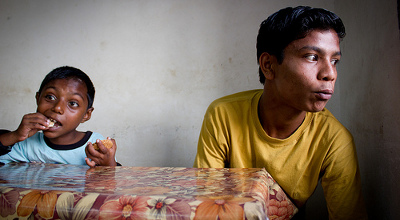Life for the boys living in India’s railway stations is a real-life “Hunger Games.” If they don’t fight, they’ll be killed. If they don’t find food and survive in this arena, they’ll starve on the train tracks.
Railway boys are boys who have run away from home and joined gangs who live in India’s train stations. They travel the country, jumping from train to train and stealing from train passengers. Nine boys have left this life behind and found earthly and heavenly family.
The boys sitting at this breakfast table survived the war. The glue sniffing, the razor blade scars, the rape and the murders have knit them together.
“This is my family,” Shad Khalil* says, gesturing to the eight other boys in the hostel kitchen. He slings his arm around the youngest boy in the hostel, pulling him close.
At 16, Khalil is the oldest boy living in this Christian hostel. His smile seems innocent, but he lost his innocence a long time ago.
Life on the Railway
Khalil, like most of the other boys in the hostel, ran away from home. Khalil left his home in Delhi at age 10. His mother came from a Catholic background but married a Muslim man.
“There was no unity,” Khalil says. “They were not like family at all.”
Khalil’s father spent many days drunk, beat Khalil’s mother and forced himself on her. He beat Khalil too, throwing household items at him. When Khalil tried to protect his mother, he was nearly beaten to death.
My grandfather was a dirty man,” Khalil says, looking out the window. Tears begin to well in his eyes. “I have a sister, I feel my grandfather is spoiling her life.”
Guilt consumes his face. I was young and wouldn’t express myself,” Khalil says, fixing his gaze on the breakfast table.“I miss my sister. Pray for me and my family.”
Khalil ran away and jumped on a train headed out of town. He eventually landed in a train station on the other side of the country, where he collected water bottles to sell, begged and stole from train passengers. He gave a portion of the profits to his gang leader for protection.
Gang leaders are boys in their late teens or early 20s who manipulate new railway boys by introducing glue-sniffing, creating the a cycle of dependency and control.
Gang leaders in Khalil’s train station were notorious for throwing boys in front of moving trains. Khalil was thrown onto the tracks and hit his head. He remembers that a man dressed in white helped him off of the tracks. He has no idea who this man was and has never seen him since.
Not long after that, Khalil met Prabal Dey,* who offered Khalil a life outside the railway.
Teaching Truth, Seeing Change
Prabal and Debjani* Dey have opened a Christ-centered hostel for railway boys like Khalil.
Glue withdrawals hit Khalil and his new brothers the first couple of weeks after they left the railway. The Deys substituted food, sports and television for glue. Yelling, fighting and cursing were commonplace in the hostel.
“Satan was working so much, I couldn’t come out of those addictions,” Khalil says, shaking his head at the memory.
Dey said it took some time for the boys to obey adults who didn’t threaten to kill them as punishment for disobedience. Now, though it’s been several years, the boys still act out, Dey says, since so much in their life needs redeeming.
“Good food, good things can’t change them,” Dey says. “One thing can change them: Jesus.”
The Deys teach God’s Truth to Khalil and his hostel brothers throughout the day and in devotional times.
“They are completely changed because of prayer,” Dey says. “They can’t sleep if they don’t have prayer.”
The Deys and the railway boys are active members of the house church that Gary and Cynthia Follen,* IMB representatives, lead. Follen mentors the railway boys and helps them work through their emotional scarring.
Follen played a pivotal role in Khalil’s journey to Christ. “When he came to a Christian worship place, he [Khalil] was very different,” Dey says. “He was anti-Christian.”
Khalil came to the hostel timid and emotionally scarred. But now, more than two years later, he’s quietly confident, and his smile illuminates his face. When visitors come, he’s the first to engage them in conversation.
Khalil talks about God’s provision in his life in almost in every sentence. “God healed my broken heart,” Khalil says.
Struggling With Stability and Perseverance
During a nightly tutoring session, Khalil’s brow furrows – the English words swim around the page. He’s not following.
Khalil is 16 years old but in the fifth grade. His years of sniffing glue hinder his memory and learning abilities, and a lack of nutrients in his formative years has made him small for his age.
“He has a lot of hurt in his life,” Dey says. Khalil puts himself down because of the years lost on the railway.
Though he has trouble studying, Khalil’s cappuccino-colored eyes and olive skin make him popular among the girls at school.
“I’m not interested,” he says, blushing. He’s got more on his mind, he explains. He wants to focus on his relationship with God. When he grows up, he wants to open a hostel just like this one.
But some days in the hostel are still hard.
The railway is freedom, Dey explains. The boys can jump from train to train and journey anywhere in India. Coming to the hostel means a life of structure and scheduling. There’s no glue or alcohol, and misbehaving has consequences –a difficult adjustment.
Four of the boys who were the first to come to the hostel have returned to the railway, making Khalil the oldest.
“I’ve been here since I was little and I’ve never left,” Khalil says.
Lost in thought, Khalil gazes down the road that leads to neighborhood’s exit. Today, he’s thinking about leaving the hostel.
He isn’t sure where he would go – but never back to the railway. “That’s a bad place,” he says.
A New Family
Khalil perseveres. Though he doesn’t make high scores on his report card, his spoken English is the best in the hostel.
“He knows by heart the word of God.” Dey says. Khalil was also the first boy to give his testimony in church and has plans to be baptized.
Unlike gang leaders in train stations, Khalil tries to protect the younger hostel boys.
“These are my brothers, I must watch out for them,” Khalil says. “This is a beautiful family—there’s love here.”
The redeemed railway boys are the family he never had.
* Name changed
Click here to view the original story at Asiastories.com.
See an error in this article?
To contact us or to submit an article























